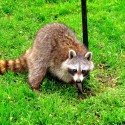Raccoons
We need to learn how to coexist with these fellow opportunists.
They arrive unbidden, veiled by darkness, masked marauders who care not a whit for property rights. They scrounge discarded veggies from compost bins and rip open garbage bags. They dig into lawns searching for grubs, cratering the turf like a party of boozy nocturnal duffers.
Mothers and their children squat in our attics and garages, squealing and chattering during the wee hours and leaving behind their smelly calling cards.
Raccoons inflame passions. A homeowner in Toronto recently ran afoul of the law after clobbering a family of raccoons with a shovel. I know of a local farmer who summarily dispatches scores of these animals every year. But like the evil orcs in Lord of the Rings more always rush in to take place of the fallen.
But let’s give raccoons their due. They, like us, are crafty, creative and possessed of an indomitable will to survive. And truth be told, we’ve abetted their survival.
Our garbage and agricultural produce has allowed raccoons to go forth and multiply like never before. And we’ve granted them immunity from predation by eliminating most of their large mammalian predators.
The ramification is a raccoon population explosion that irritates us, but has life and death implications for other animals. Turtles lose most of their eggs to raccoons. Ground nesting birds and other small terrestrial creatures are sacrificed to the raccoons’ insatiable hunger.
While we will never be free of the depredations of raccoons we can take steps to limit the damage.
I have shut down my bird feeders for the summer because a family of racoons has been gorging on the fallen seed. Netting can be used to cover veggie patches and garbage can be made less accessible.
We need to learn how to coexist with these fellow opportunists.











